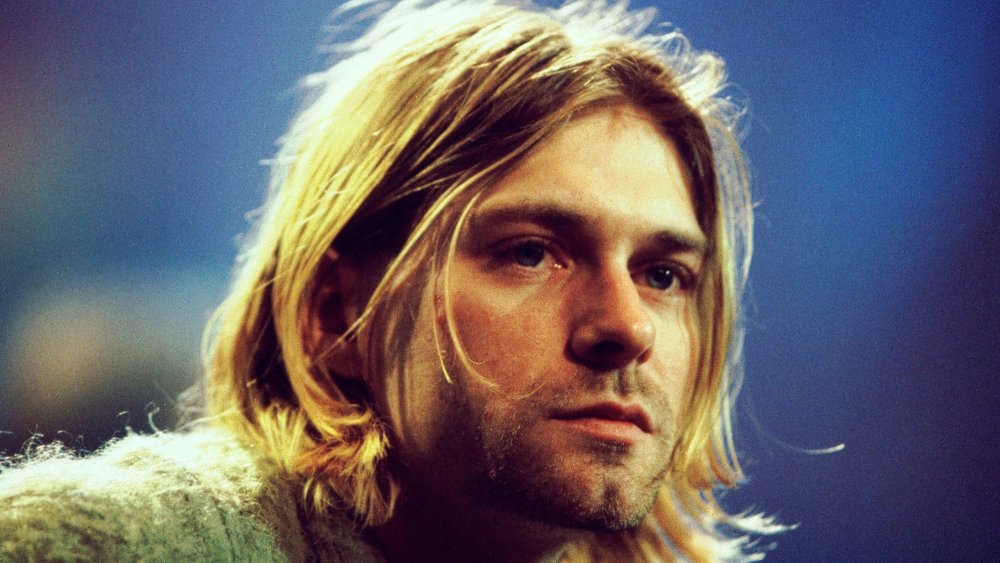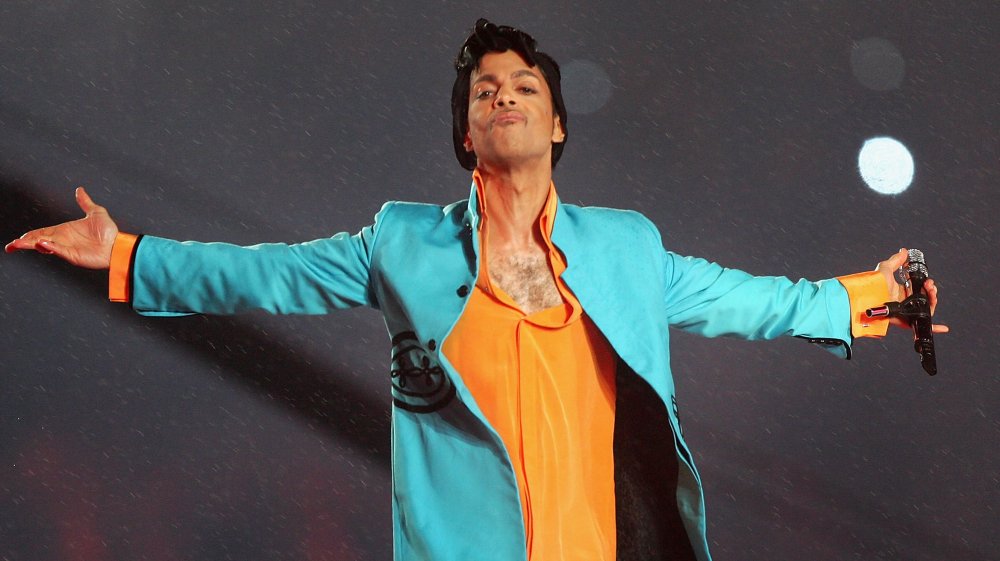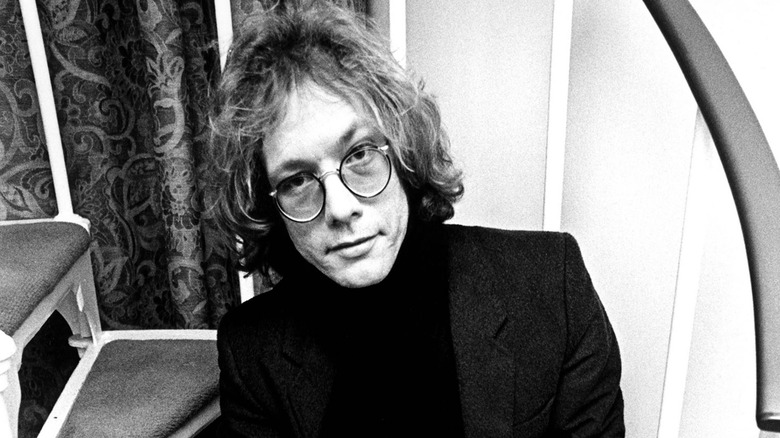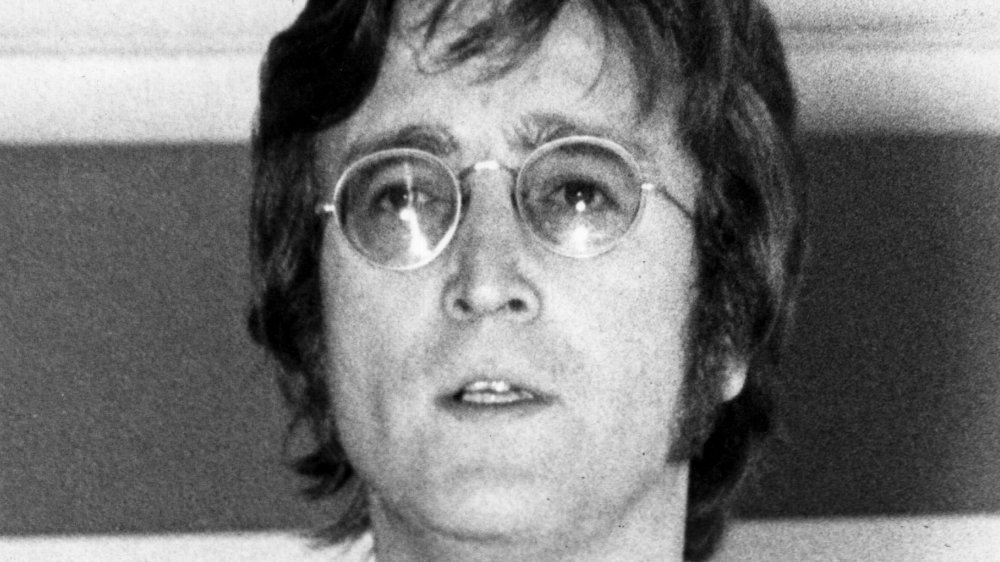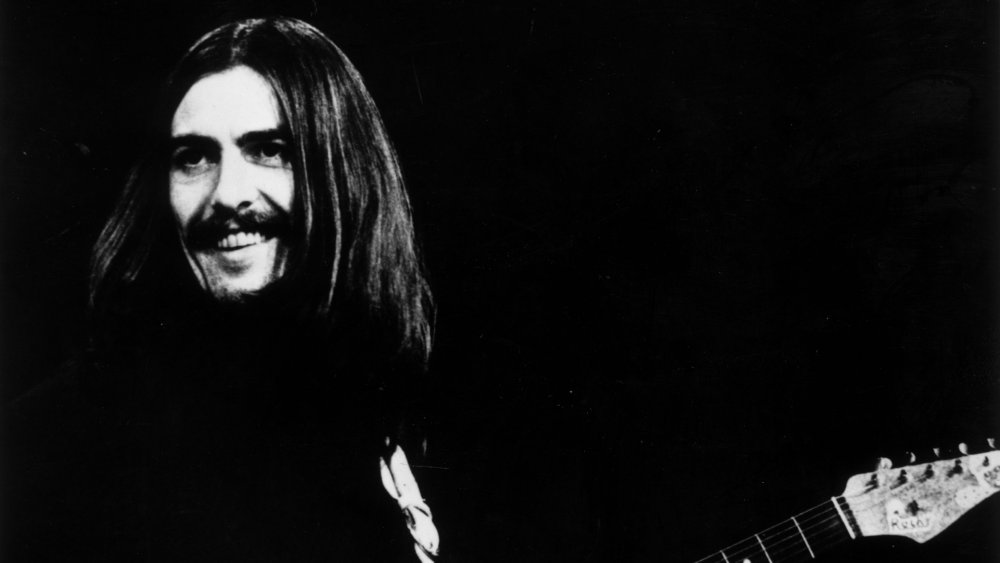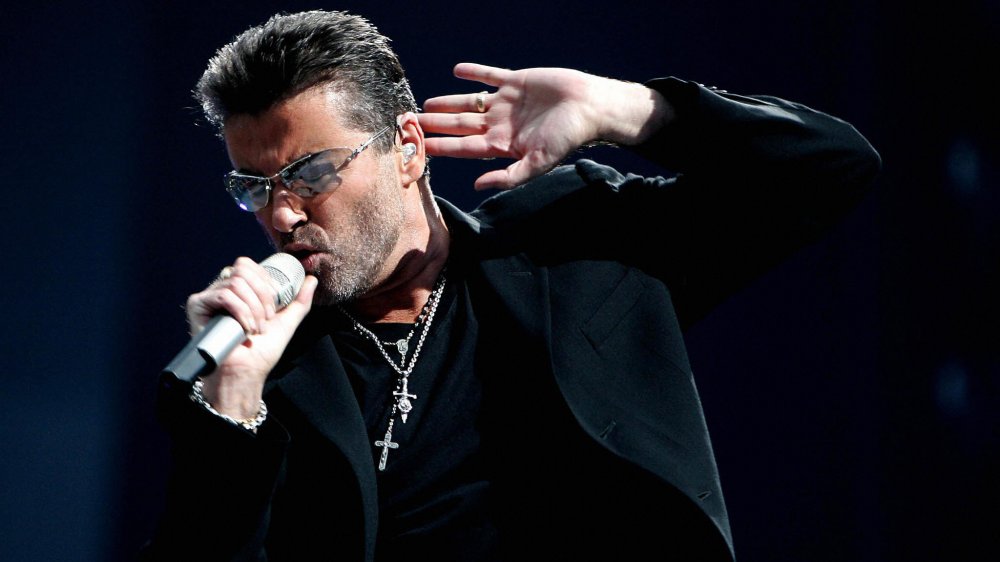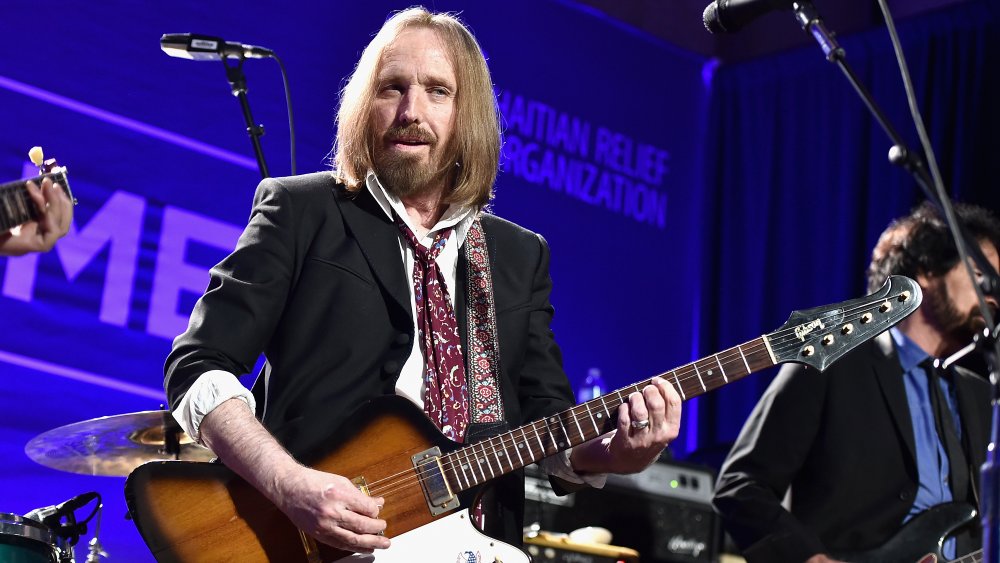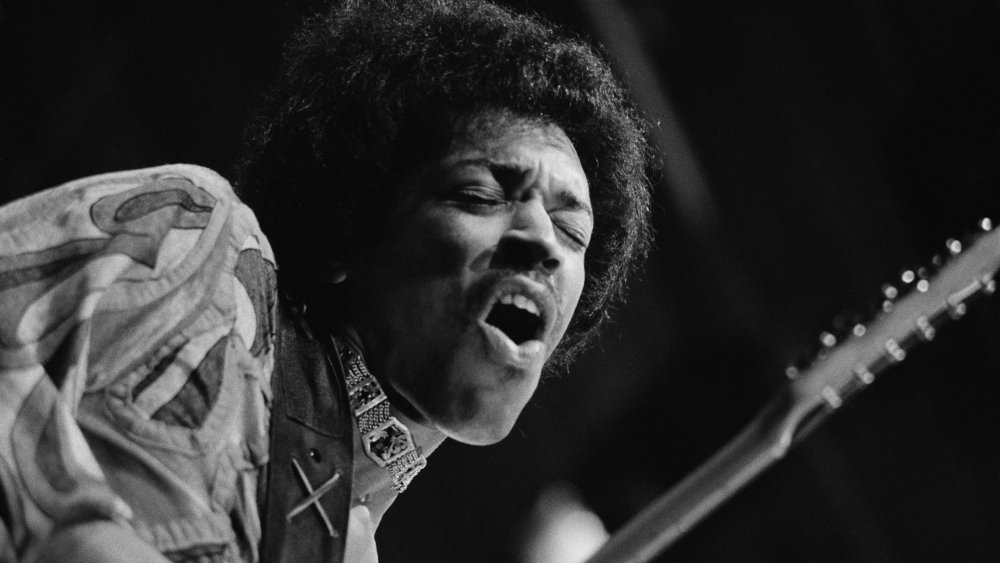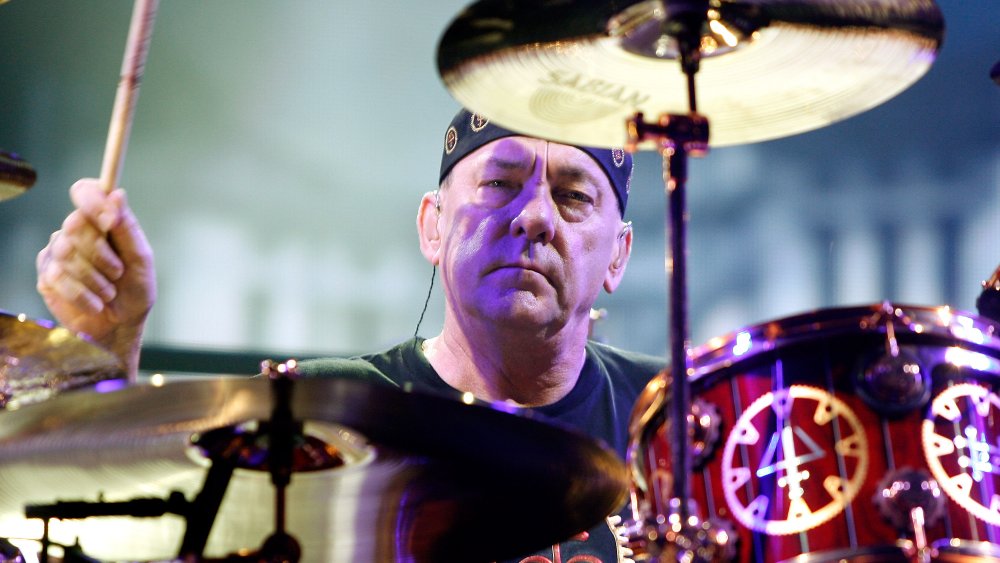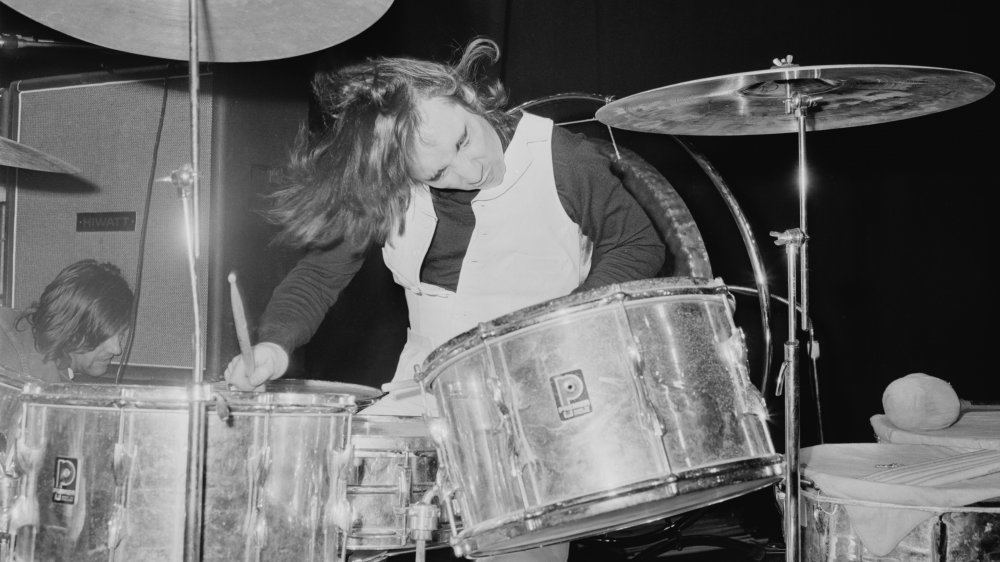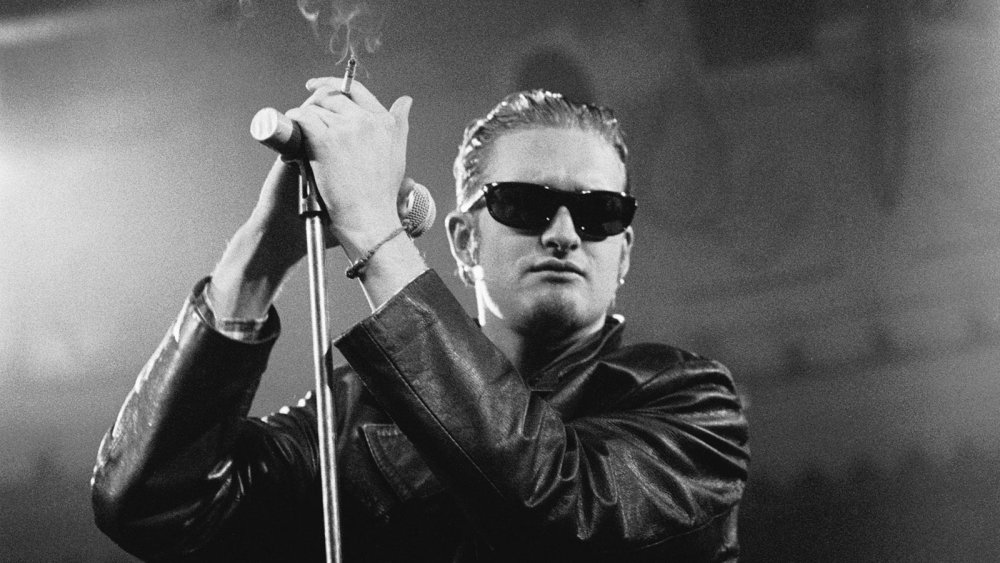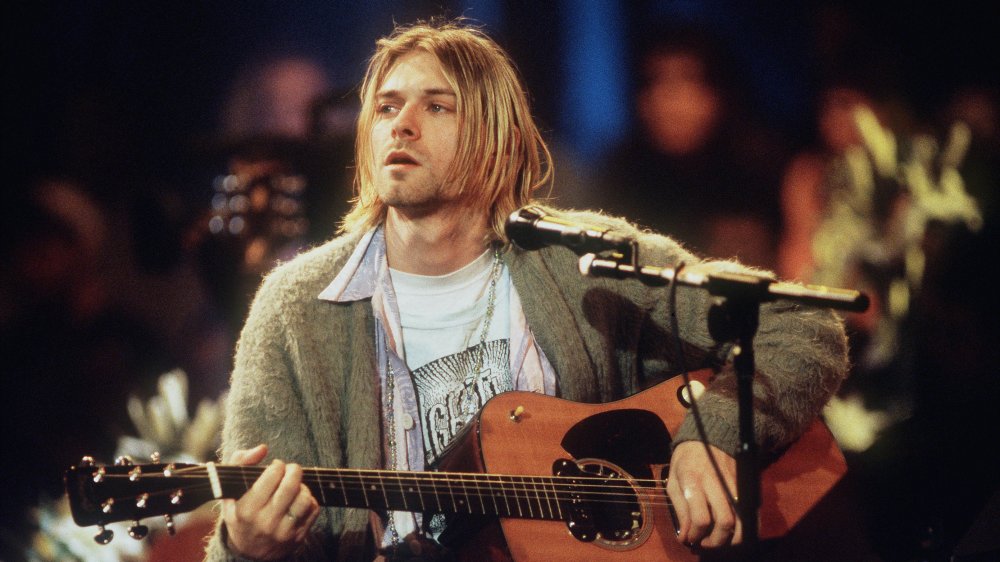Final Interviews Of Famous Rock Stars
Any music journalist will tell you that when it comes to interviewing rock stars, you never know what you're gonna get. They might be brimming with excitement over an impending new release, they might be jet-lagged or drunk beyond comprehension and barely capable of more than uttering a few syllables, or it might fall anywhere in between. When you're paid to rock for legions of adoring fans and you can afford to wipe your butt with $20 bills (and maybe you do sometimes, just for chuckles), you can kind of just go wherever the wind blows you.
One thing an interviewer rarely expects, however — not never, but rarely — is that their current assignment will end up being the last interview the subject ever gives. These final records are just as wildly varied as the stars themselves. Some find them excited and optimistic about a non-existent future, some could politely be described as "self-indulgent," and some absolutely portend the doom that the interviewees knew was right around the corner.
All of them, though, offer insight into the lives of their subjects. And like the best rock tunes, they can put us through a gamut of emotions. Here are the last interviews these famous stars ever sat for before shuffling off to rock 'n' roll heaven.
Prince's final interview touched on transcendence
There's some debate as to what exactly was the last interview given by Prince — an in-depth piece published by Ebony magazine in December 2015 was mysteriously deleted the next day, for reasons that still haven't been explained — but so far as anyone can confirm, the last official talk with the Purple One by a major publication was posted by The Guardian in November of that year. In it, Prince laid out the concept for what would be his final tour, clarified his famous statement about the death of the internet, and unknowingly waxed prophetic by way of explaining his desire for "transcendence."
Prince said that he had conceived his "Piano & A Microphone Tour" (which delivered exactly what it promised) to challenge himself. As he explained, it would be like "tying one hand behind my back," adding that, "I won't know what songs I'm going to do when I go on stage, I really won't. I won't have to, because I won't have a band." He also explained that he was perfectly aware that the internet was doing fine, but that it was the ability of artists to make a living that had fallen by the wayside ("Apple's doing pretty good, though, right?" he said). But his last sit-down left us with one indelible image — of Prince, playing and singing by himself for hours, as he said he'd done the previous night. "I just couldn't stop," he said, adding that, "[It was] like an out-of-body-experience. That's what you want. Transcendence."
Warren Zevon learned to enjoy every sandwich
There was never another rock star quite like Warren Zevon. His singing voice was ... unique, to say the least, and he wrote songs with titles like "Roland the Headless Thompson Gunner" and "Gorilla, You're a Desperado," and he actually made them work. During the '80s and '90s, he was known to sit in as bandleader for Paul Shaffer on David Letterman's Late Show when needed, and over those years, he and Letterman developed a close friendship. When Zevon received a terminal cancer diagnosis in 2002, Letterman did something he never had before: He blocked off his show's entire hour for one guest.
The show never got sappy or sentimental. Zevon displayed his trademark humor by deadpanning, "I might have made a tactical error in not seeing a physician for 20 years," he said during the interview, and joked that the only real adjustment he'd made was telling them to step on it at the dry cleaners. But when Letterman asked if his friend's diagnosis had given him any insights on life, Zevon turned serious long enough to deliver one of the greatest pieces of advice we've ever heard, saying, "You put more value on every minute. ... You're reminded to enjoy every sandwich."
Zevon performed several songs throughout the hour, and it was often obvious that his illness was giving him trouble. But for the final song he ever publicly performed, he pulled out his old classic "Roland the Headless Thompson Gunner" at Letterman's request, and he freaking nailed it.
John Lennon's final interview was heartbreaking
We won't mince words here. If you're a Beatles fan and/or you love John Lennon, his words during his final interview — with Rolling Stone on December 5, 1980, three days before he was murdered — will make you shake your fist at the heavens. Lennon, who was famously kind of a jerk, was coming off an extended hiatus from music which saw him seem to truly become a better person and father. He'd just made a buttload of awesome new songs (which became the posthumous Grammy-winning album Double Fantasy), and he was all too excited about a future he would never get to see.
Lennon spoke to the interviewer (who noted they had met him in 1968) for hours, easily joking around and segueing into long, fascinating anecdotes about his music, his wife Yoko Ono, the Beatles, and his troubles of the '70s (he finally kicked drugs after he and Yoko had a stillborn child, for instance). But here's what's really gonna get you. In response to a suggestion that he and Yoko should have their own late night show, Lennon said, "Yeah, of course we could. John and Yoko might do it one day. We often talk about that. It might be fun. But there's time, right? Plenty of time. ... And it will be fun to be on the cover of Rolling Stone. It will be fun, won't it, to start 1981 like 1968?"
George Harrison was a rock star searching for knowledge
George Harrison, a devotee of the Hare Krishna sect of Hinduism since the mid-'60s, was always the most spiritual of the Beatles. And while he never got in anyone's face at an airport (that we know of), he wasn't shy about expounding on the tenets of his religion. In 1997, only a month before he was diagnosed with the throat cancer that would eventually kill him in 2001, Harrison appeared on VH1 alongside his old friend and sitar mentor Ravi Shankar (whose album Chants of India he'd just produced) to drop some knowledge on us all.
"I get confused when I look around at the world, and I see everybody's running around," Harrison said. "As Bob Dylan said, 'He not busy being born is busy dying.' And yet, nobody's trying to figure out what's the cause of death and what happens when you die. And that, to me, is the only thing, really that's of any importance. The rest is all secondary."
Harrison suggested that knowledge itself was the meaning of life, and he even quoted the Bible to prove his point. "'Knock and the door will be opened,'" he said. "And it's true. If you want to know anything in this life, you just have to knock on the door. ... Every atom in our body, is made from this perfect knowledge, this perfect consciousness." Harrison was only 58 when he died, but we're starting to think it's because he had learned all there was to know.
George Michael had a lot of regrets
George Michael's career beginnings as lead singer of the bubblegum pop group Wham! U.K. (later shortened to simply Wham! but retaining that annoying exclamation point) belied the fact that the dude was actually a pretty great singer and songwriter. Later Wham! releases (agh, we really hate that) and his subsequent solo career would bear this out, as he eventually achieved the kind of respect normally reserved for your Freddie Mercury and Elton John types. To hear him tell it, though — which, in his final interview, he did — none of it was worth the price.
"If I'm really honest, something, somebody, some entity wasn't ready to let me have a full life," Michael said in a BBC2 interview shortly before his death on Christmas Day 2016 (via NME). "I still had to make more records, I still had to find the next creative step — it was as though it was a choice, it was: Do you find your place in life, your place with a partner/lover, or do you just carry on down this road to the next great achievement? I made the choice eventually for the former. On an emotional level, it was a choice between one or the other."
In the documentary George Michael: Freedom, which the singer had been laboring away on mere hours before his death, he described his life as "a waste of time, a waste of effort." His millions of fans would disagree, and we'll just shut up about the exclamation point now.
There was some foreshadowing in Tom Petty's final interview
Tom Petty broke our hearts when he died at only 66, and his final interview with the Los Angeles Times is one of those that makes it so much worse — not because he was down and out, but because he was just on top of the freakin' world. He led off talking about what a "wonderful year" it'd been, he bubbled over with enthusiasm for proteges the Shelters (whose second album he intended to produce), and went on at length about how songwriting and studio work gave him purpose. There was no reason to think that he was anywhere near the end of the road, and yet buried within the interview was a piece of grim foreshadowing.
Referring to himself and his band the Heartbreakers, Petty said, "If one of us went down, or if one of us died — God forbid — or got sick..." he trailed of before finishing, "We're all older now. Then, we'd stop. I think that would be the end of it, if someone couldn't do it."
Come on, Tom, you might be saying. After that, please leave us with something uplifting. Well, how about this? "[Music is] about moving people, and changing the world, and I really believed in rock 'n' roll — I still do. I believed in it in its purest sense, its purest form. ... I'm just trying to get the best I can get out of it."
Jimi Hendrix's final interview was full of fluff
When Keith Allston of NME sat down to interview Jimi Hendrix on September 11, 1970, there was no way he could possibly know that he was recording the final public record of the inner thoughts of an absolute legend. If he had, he probably would've asked way more interesting questions. Instead, he lobbed Hendrix the typical fluff about the U.K. music scene, whether he really deserved his rep as a guitarist, and whether he liked money. Presumably, a potential question about what Hendrix had for breakfast that morning was dismissed as being too probing.
Allston refrained from asking even a single question that would be of interest to the King of All Guitars after his death, but Hendrix answered each question as completely and thoughtfully as possible, maybe because he'd just gotten done smoking all of the weed. The interviewer did allude to the fact that Hendrix had recently said that classical music would be informing his next album to a bigger degree than Pink Floyd or Cream, which sounds awesome. The interview wrapped up with Allston extracting the scintillating insight from Hendrix that he'd perhaps like an indoor pool one day.
Neil Peart was honest and introspective
Neil Peart, King of All Drums and the primary lyricist for the Canadian band Rush, didn't give a heck of a lot of interviews. He sadly passed away from brain cancer in January 2020 at only 67 years old, but his last interview took place in 2017. Fortunately, his interviewer had the good sense to dig into many topics besides just how rad Peart was at drumming, and Peart's concise way with words made for a fascinating portrait of the man.
On his libertarian politics, Peart explained, "I believe in taxation and healthcare that is outside the usual libertarian mandate, because I don't want people to have to suffer. It's as simple as that." On his atheism, he said, "I was called a faith-basher recently, and it went to my heart. I don't want to be an anything-basher. I don't like to make enemies." On his late-life drum lessons from jazz legend Freddie Gruber, he elaborated, "You have to challenge your own limitations and your own expectations of yourself." And on his relationship with his Rush bandmates, he said, "The three of us really balance each other out. We're still the same suburban goofballs that we always were. And we're so fortunate to have a relationship like that." Peart was one of the more cerebral rockers who ever lived, and in case we didn't make it clear, holy crap, could that guy ever play the drums.
Keith Moon went out like a real rock star
Keith "the Loon" Moon of the Who was a legendary and awesome drummer, and both he and guitarist Pete Townshend appeared on Good Morning America about a month before Moon's death from an overdose. And if you know anything at all about Moon, his words and general disposition will not surprise you. He approached death as he lived — drunk, with merry good humor, making everyone around him uncomfortable.
The always jovial piece of sentient wood David Hartman interviewed the pair, regarding Moon in particular with barely concealed disdain. "Are you in control of your life at all?" he asked the legendary skin smasher. "Certain days," Moon replied. And what were the other, more uncertain days like? "Quite out of control," Moon said. "Amazingly drunk." The master of understatement also revealed that he enjoyed being out on the road "very much," and he opined that he hadn't changed a bit in 15 years. For the record, Moon died at 32, so this sounds exactly right. The drummer wound up by plugging the August 21, 1978 release of his band's classic album Who Are You, and then he passed away on September 7.
Layne Staley was in a whole lot of pain
The intense drug addiction of Alice in Chains lead singer Layne Staley in no secret, and if you want to be truly haunted, read Layne Staley: Angry Chair — A Look Inside the Heart and Soul of an Incredible Musician. The book contains a section detailing the singer's final interview just months before his death, and it's clear that Staley knew a) that the end was nigh, and b) that it was the totally avoidable consequence of his own terrible decisions.
"I know I'm dying. I'm not doing well," he said, before going on to explain in excruciating detail just how awesome hard drugs are. "I'm not using drugs to get high like many people think. I know I made a big mistake when I started using this s**t. It's a very difficult thing to explain. My liver is not functioning, and I'm throwing up all the time and s******g my pants. The pain is more than you can handle. It's the worst pain in the world."
Staley bitterly lamented his lost fight, saying, "I invested a lot of money on treatments. I know I did my best or what I thought would be right. I changed my number. I don't wanna see people anymore, and it's nobody's business but mine." Look here — if you happen to be considering using hard drugs, buy a copy of that book, read it cover to cover, and change your mind.
Kurt Cobain's final interview involved eating pizza
Nirvana singer and guitarist Kurt Cobain seemed to be in a perfectly fine place during what is thought to be his last interview, with the prolific Canadian journalist known as Nardwuar, a few months before his death. The interview was caught on video, allowing us to witness Cobain, his wife Courtney Love, and his bandmates all chowing down on pizza as Nardwuar slings weird questions at them.
Many of Cobain's responses, in fact, are difficult to ascertain, as they're given through mouthfuls of pizza. Everyone was in a great mood, nothing of substance was asked or learned, and Nardwuar was basically treated like the geeky dude trying to hang out with the cool kids, which he kind of was. It's actually rather comforting to see Cobain at such relative peace, which also appeared to be the case during what might have been his final print interview, with Rolling Stone.
Of particular note, when asked just how literal the cut In Utero song "I Hate Myself and I Want to Die" was, Cobain replied, "As literal as a joke can be. Nothing more than a joke. And that had a bit to do with why we decided to take it off. ... That pretty much defines our band. It's both those contradictions. It's satirical, and it's serious at the same time."
